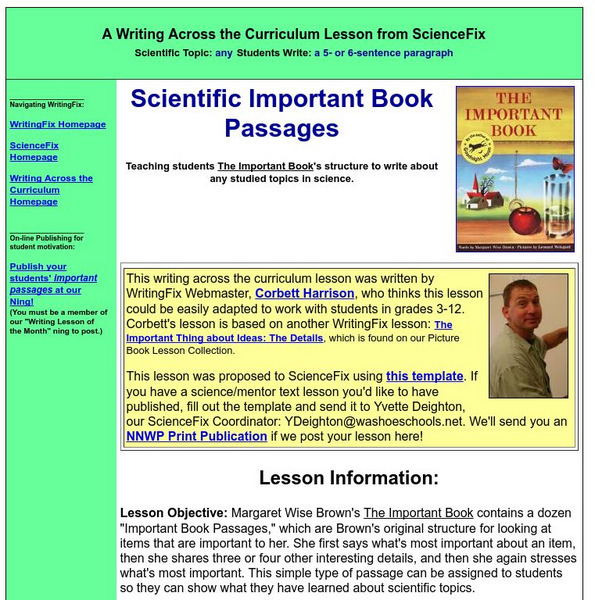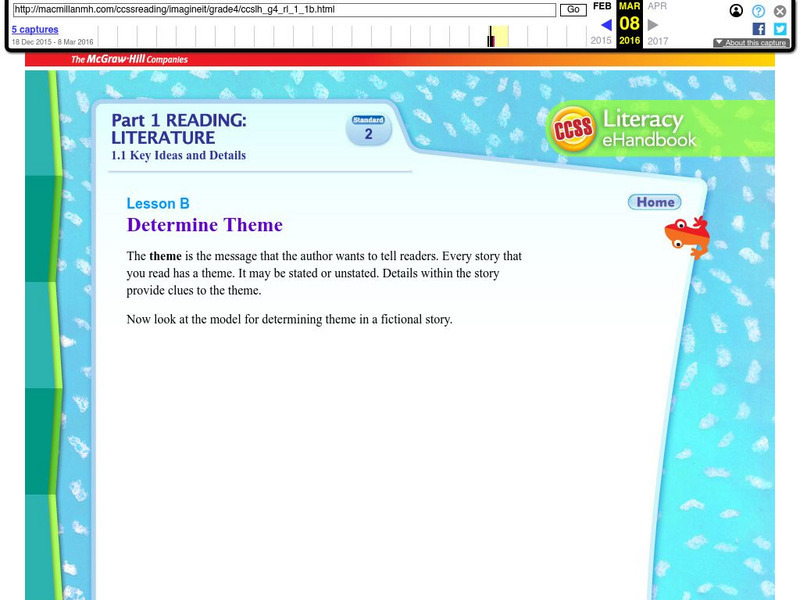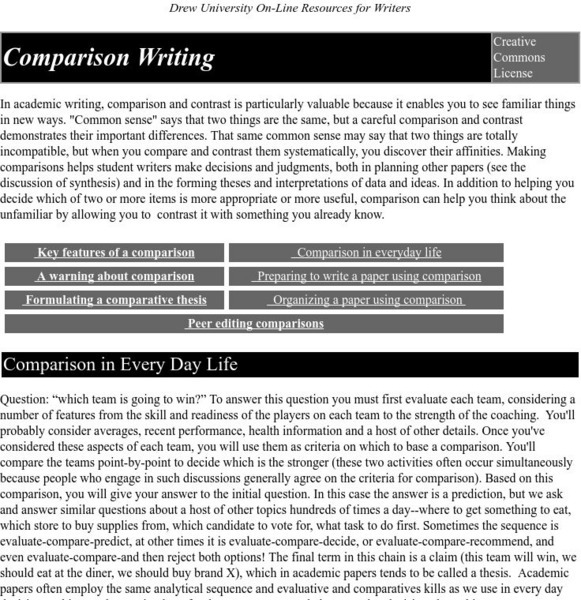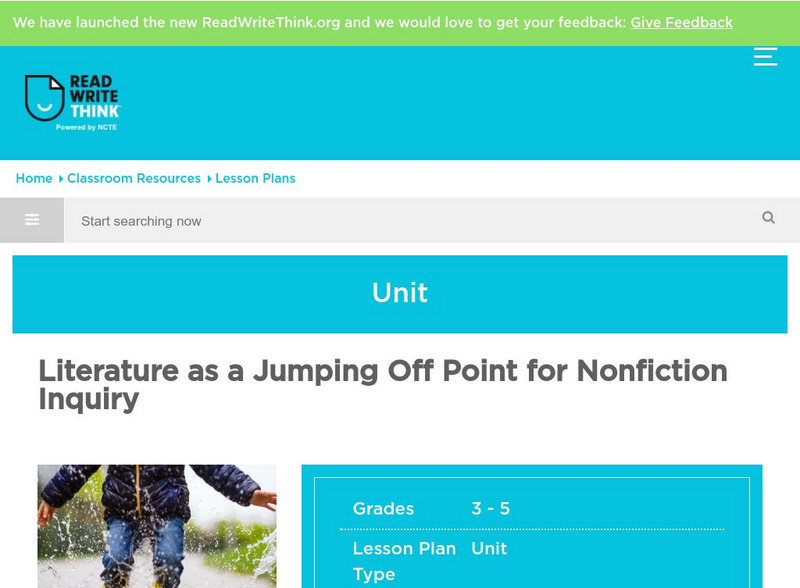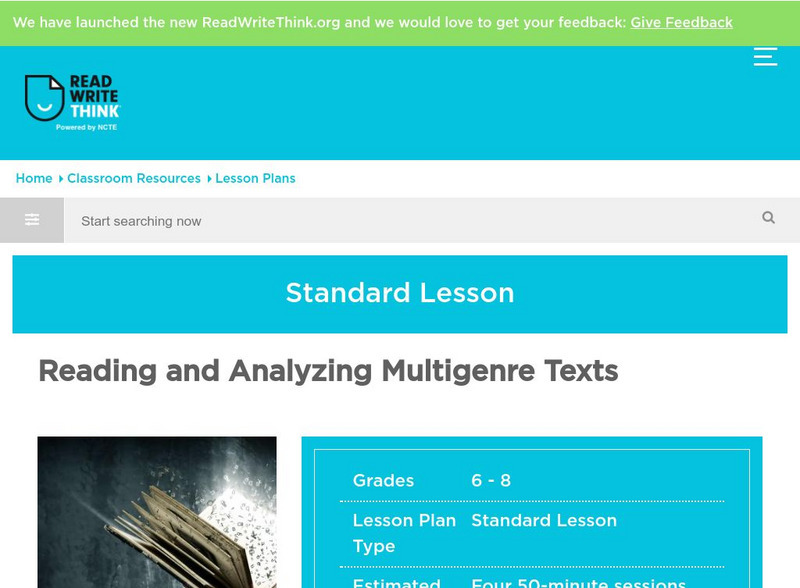Education Development Center
Making Mathematics: Mathematics Research Teacher Handbook: Getting Information
Information for teachers on teaching students how to research and write on mathematical topics. Includes tips for active reading, researching online and journal sources, and conducting interviews to gather information.
AdLit
Ad lit.org: An Introduction to Analytical Text Structures
Many students are used to writing narratives - stories, description, even poetry, but have little experience with analytical writing. This article is an introduction to six analytical text structures, useful across content areas. See...
Online Writing Lab at Purdue University
Purdue University Owl: Fiction Writing Basics
This resource discusses some terms and techniques that are useful to the beginning and intermediate fiction writer, and to instructors who are teaching fiction at these levels. W.11-12.3a Narratives
Writing Fix
Writing Fix: To Imitate Two Nature Writers
In this lesson each writer will compose and revise a "showing" description inpsired by an object or a place in nature. Long before drafting, students will discuss and compare the writing styles and techniques of published authors who...
Writing Fix
Writing Fix: Responding to Comparison/contrast: Compare/contrast Essay [Pdf]
This PDF lesson focuses on writing a comparison/contrast essay, which is a great format for helping students think deeply about two ideas or concepts with multiple similarities and differences. This type of essay has four-parts -1) an...
Writing Fix
Writing Fix: Scientific Important Book Passages
Students read and examine the structure of The Important Book by Margaret Wise Brown and then follow that pattern while writing about the most important things about various scientific topics. Printable handouts and student samples are...
Writing Fix
Writing Fix: Writing Scientific "Recipes"
Adapted from a lesson in the book 51 Wacky We-Search Reports by Barry Lane, this lesson asks students to read several recipes to gain an understanding of how they are written and the types of words they use. Then students demonstrate...
McGraw Hill
Mc Graw Hill: Part 1 Reading: Literature: Determine Theme
Learn how to determine a theme of a story on this site. Click on model at the bottom right and continue through lesson.
E Reading Worksheets
E Reading Worksheets: Genre Activities
This learning module features "genre" as the topic for PowerPoint presentations, lessons, and quizzes. Numerous projects with the "genre" theme are available for further exploration as opportunities for more in-depth investigations.
Polk Brothers Foundation Center for Urban Education at DePaul University
De Paul University: Center for Urban Education: Prose Constructed Response Organizer [Pdf]
This resource provides a downloadable graphic organizer designed for preparing a constructed response that must compare two sources that make the same claim: two articles or an article and a video.
Other
Mo Dept. Of Ed.: Analyzing and Evaluating Literary Works
Lesson plan designed for eleventh graders. Students analyze and evaluate a short story for elements of literary works such as theme, mood, word choice, imagery, tone, and main idea. Includes a student handout and a scoring guide. It...
Other
Lcc: Comparison and Contrast: Culture Capsules
This resource provides links to eight comparison and contrast essays written by English as a Second Language (ESL) students. Each essay involves comparing and contrasting two different cultures or specific aspects in those cultures.
Other
Writing Scientific Reports
This tutorial site provides links to articles about writing a scientific report or essay as well as to sample essays.
Other
Eduscapes: Themes & Literature Circles
This site provides guidance in creating literature circles based on cross-curricular themes that will help to improve literacy. The site emphasizes both theory and practice, with lots of practical suggestions.
Other
Drew University: Resources for Writers Comparison Writing
Sections of this site include key features of the comparison essay, comparisons in daily life, formulating a thesis, preparing to write, and organizing a comparison essay. The site also includes a paragraph of caution when writing about...
ReadWriteThink
Read Write Think: Flying to Freedom: Tar Beach & the People Could Fly
Comparing and contrasting works and looking for underlying themes and messages are at the heart of this multicultural lesson plan. Provides links to several background resources, and suggestions for assessment.
ReadWriteThink
Read Write Think: Book Reviews, Annotation, and Web Technology
Contains plans for six lessons that ask middle schoolers to write group book reviews after reading texts in literature circles. Students also learn about research and documentation as they put together their reports. In addition to...
ReadWriteThink
Read Write Think: Literature in Nonfiction Inquiry
This lesson plan involves students working in groups after reading a work of literature to develop text sets. Included in the lesson plan is an overview, practice, objectives, resources, preparation, and more.
ReadWriteThink
Read Write Think: Question and Answer Books From Genre Study to Report Writing
Contains plans for eight lessons that explore Question and Answer Books and ask students to do research in order to write their own. In addition to objectives and standards, these instructional plans contain links to sites used in the...
ReadWriteThink
Read Write Think: Using Picture Books to Teach Characterization
Contains plans for two or three lessons that ask learners to examine characterization in picture books to use as models for their own writing. In addition to objectives and standards, this instructional plan contains links to sites used...
ReadWriteThink
Read Write Think: Choose Your Own Adventure: A Hypertext Writing Experience
This series of lessons involves student collaboration, writing and analytical skills, technology and imagination. While the instructional activity suggests use of FrontPage, it would also be possible to use a number of other authoring...
ReadWriteThink
Read Write Think: Everyone Loves a Mystery a Genre Study
Contains plans for lessons that teach about the mystery story genre, including its story elements and vocabulary. In addition to objectives and standards, this instructional plan contains links to sites used in the lessons as well as...
ReadWriteThink
Read Write Think: Using Science Texts to Teach the Organization of Nonfiction
Contains plans for three lessons that use science textbooks to teach about the organizational features of nonfiction such as labels, captions, headings, and fonts. In addition to objectives and standards, this instructional plan contains...
ReadWriteThink
Read Write Think: Reading and Analyzing Multigenre Texts
This lesson plan deals with the process of analyzing a variety of literary texts from poetry and letters to diary entries and works of fiction. Included in the lesson plan is an overview, practice, objectives, resources, preparation, and...






![Writing Fix: Responding to Comparison/contrast: Compare/contrast Essay [Pdf] Lesson Plan Writing Fix: Responding to Comparison/contrast: Compare/contrast Essay [Pdf] Lesson Plan](https://d15y2dacu3jp90.cloudfront.net/images/attachment_defaults/resource/large/FPO-knovation.png)
